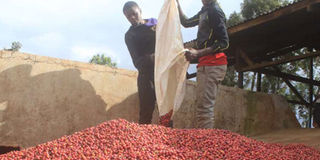Breaking News: CDF Ogolla involved in KDF chopper crash
Desperate farmers shun co-ops, resort to hawking their coffee

Coffee cherries being poured into a collector for pulping at Ndaroini factory in Nyeri County on August 15, 2017. Farmers have complained of delayed payment. PHOTO | JOSEPH KANYI | NATION MEDIA GROUP
What you need to know:
- Mr Kamunge added that farm inputs were expensive thus compromising quality and bringing down prices.
- The growers say they have emergencies that call for immediate action.
Farmers in central Kenya have resorted to coffee hawking, blaming their societies for taking months to pay them.
Poor payment, high prices of inputs and poor management have driven farmers over the edge to earn easy and desperately-needed cash from brokers.
Experts however warn that the trend will relegate once big factories and societies to warehouses.
POVERTY
Several factories and cooperative societies in Mathira and Tetu constituencies, Nyeri County are on the brink of closure.
Mr John Kamau, a farmer in Mathira tends, to his coffee on a chilly Friday morning in Nyeri.
He says coffee farming brings more pain than happiness as he continues to wallow in poverty despite the liberalisation of the industry years ago.
“These coffee trees were planted by my father in the 1950s. He used its proceeds to send my siblings and I to school.
"I cannot rely on coffee to educate my children,” Mr Kamau said.
BROKERS
Mr Kamau said the highest he had ever received from his cooperative in the last three years was Sh38 per kilogramme.
“The societies keep shifting blame on us but they have failed us.
"Farm inputs are too expensive for anyone earning Sh38 per kilo of cherry delivered to factories,” he said.
While cooperatives discourage farmers from dealing with brokers, the growers say they have emergencies that call for immediate action.
“We need school fees for our children and drugs and feeds for our animals.
"Most of us do not have any other source of income and that is why we end up hawking our produce,” he said.
PAYMENT
However, some factories are paying their farmers above Sh100 per kilogramme of cherry.
And those selling their coffee at gate prices end up benefiting counterparts in cooperatives that pay the highest.
“We do not know who buys our coffee but we know they take it to better paying cooperatives,” Mr Kamau said.
The brokers offer money directly to farmers as opposed to societies, which keep their proceeds until the time a marketer pays the coop.
They buy the cherry at between Sh50 and Sh70 per kilogramme.
SUSTENANCE
Five factories attached to Mathira North Coffee Society are at a great risk of closure should hawking persist.
Kiamariga, Kabiruini, Hiriga, Ngorano and Kahiraini factories produced 391,000 kilogrammes in the 2015/16 coffee year, compared to 1.4 million kilogrammes the previous year.
Mr Newton Kamunge, a farmer, said Ngorano factory pays Sh38 per kilo while the other processors fork out Sh28.
“We resorted to hawking because relying on the factory can no longer sustain our needs,” he said.
EMPLOYMENT
Mr Kamunge added that farm inputs were expensive thus compromising quality and bringing down prices.
Mathira North Coffee Society manager Douglas Warutumo said coffee hawking had become a disaster, prompting the organisation to lay off 26 factory workers.
“Cherry delivered to the factory is minimal compared to the operation costs,” he said in a recent letter addressed to Nyeri Agriculture executive Robert Thuo.
Mr Warutumo said neighbouring coffee cooperatives opened doors for members from other societies.
“This has made some residents buy coffee from poor farmers and sell it at exorbitant prices,” he added.
PERMITS
Another coop in a similar situation is Aguthi Coffee Society in Tetu, whose production has tumbled as a result of splits.
Aguthi has Kangaita, Kagumo, Thageini, Gaaki Central and Gititu factories, which produced 344,739 kilogrammes in the 2016/17 coffee year compared to 707,241 kilos in the 2014/15 season, according to data by the county Agriculture department.
Aguthi Society chairman Wachira Ndiang’ui blamed the rise of hawking to the procedure used by the devolved unit in issuing coffee movement permits.
“The Coffee Board of Kenya should be given back its mandate to stop hawking. At this rate, factories will shut down,” he said.
Most farmers affiliated to the society have moved to others that offer high prices.
Mr Thuo ordered the arrest anyone transporting coffee without a permit.





